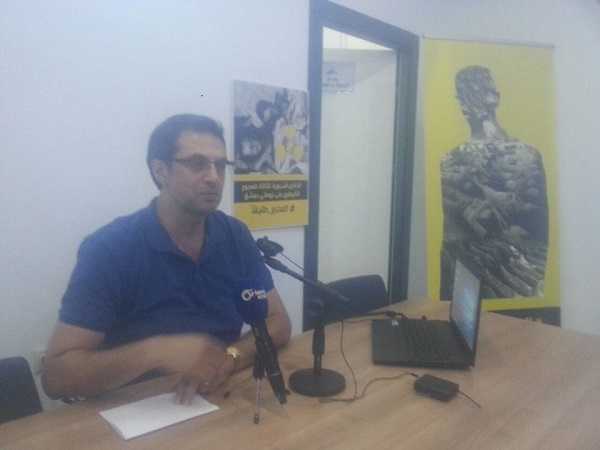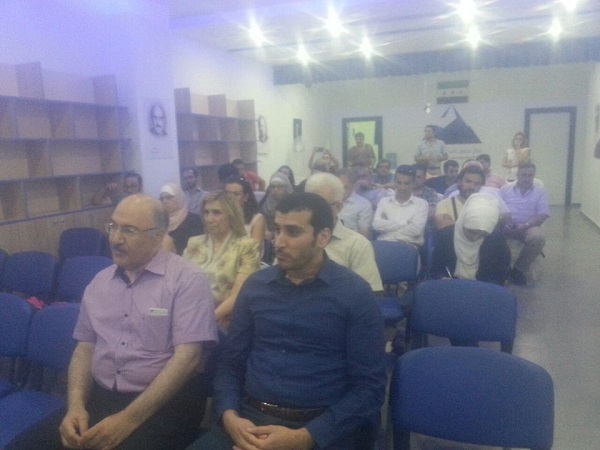Writing by Abdul Salam Haj Bakri
(Zaman al-Wasl)- Unheard stories and new scenes presented for the first which time had supposedly closed the door on, were presented for participants in the demonstration organized by the media network Jeron in the third commemoration of the chemical massacre that the regime committed in al-Ghouta east of Damascus. The presenters offered these scenes to the audience who participated in the demonstration held yesterday in Harmoon Center for Contemporary Studies in the Turkish city of Gaziantep.
Doctor Mohammad Katoub a member of the American Syrian Doctor’s Association who worked in the city of Douma at the time of the massacre spoke between fastened heart beats and unshed tears remembering some of the scenes of the massacre to affect others and in turn he was affected. He made the audience cry with stories filled with painful details.

Mohammad and his colleagues were forced to choose between two bitter options, treating an elderly man or a child first, a fighter or a civilian, “hundreds were on the verge of death by chocking from Sarin gas, and everyone was in dire need of immediate treatment or they would become an additional number added to the number of martyrs.”
-Continuous Violations-
Away from emotions and feelings, Doctor Katoub spoke of the number of times the regime bombed using chemical weapons indicating that 297 instances have been recorded where the regime used Chlorine gas, Sarin gas or Mustard gas. There have also been 40 cases of chemical bombing with unknown chemicals which doctors were unable to identify, suggesting that chemical bomb used is perhaps a combination between two chemical substances or a strange gas not used before.
Katoub spoke of 70% of the cases of chemical bombing happening after the United Nations decision to withdraw the al-Assad regime’s chemical weapons, and that 40% of the regime’s use of Chlorine gas in bombing happened after the Security Council decision to considered military use of chlorine as an international crime.
Katoubi wanted with this information to highlight the international silence about al-Assad’s crimes which have been reinforced by the international decisions issued in his right. Katoubi called for self-sufficiency and ensuring that the necessary precautionary and treatment needs are available to protect from chemical weapons which the regime will not stop using to kill Syrians especially when they achieve major success on any front in Syria.
Despite his desire to forget the painful details and the cases of death he witnessed, he asked the Syrian opposition and reporters to continuously remind the public of al-Assad’s chemical massacres and work to get credible evidence about them to the international forums to reach the point of sending Bashar al-Assad to the International Criminal Court and the War Crime Court.
The presentation was followed by a recorded presentation of live footage from the chemical massacres and images of the civilians who fell, their group burial which included hundreds of children, women and elderly.

-Love of Life-
The audience also listened to stories from eye witnesses who were present for the massacre and lived it whose stories have not been heard before. One of the attendees said of them, “if not for the nuclear bombing of Hiroshima we would have said that this massacre is the ugliest in human history.”
The former head of the local council in Zamalka city, spoke of some of what he witnessed that terrible day. He indicated that the paramedical teams were saving Sarin victims to them become martyrs when they were poisoned by the gas, and this happened with some reporters who were working to document the massacre with sound and image leading to the death of some of them also affected by the poisonous gas.
But he appeared very proud of the sons of al-Ghouta persevering in the face of the most notorious criminals, for despite the death of some of them in that ominous occasion and the continued deaths on a daily basis due to various weapons, this has not taken away their passion for life and remaining. He spoke of a group marriage of 50 young men and women days prior in the same place that was subject to the chemical bombing in Zamalka.
It must be mentioned that the number of victims, documented by name, of the chemical massacre committed by the al-Assad regime on 21 August 2013 is 1370 persons, where the people of al-Ghouta suggest the number is closer to 2000. In addition, over 10 thousand others were wounded in the attack to varying degrees.
(Zaman al-Wasl)- Unheard stories and new scenes presented for the first which time had supposedly closed the door on, were presented for participants in the demonstration organized by the media network Jeron in the third commemoration of the chemical massacre that the regime committed in al-Ghouta east of Damascus. The presenters offered these scenes to the audience who participated in the demonstration held yesterday in Harmoon Center for Contemporary Studies in the Turkish city of Gaziantep.
Doctor Mohammad Katoub a member of the American Syrian Doctor’s Association who worked in the city of Douma at the time of the massacre spoke between fastened heart beats and unshed tears remembering some of the scenes of the massacre to affect others and in turn he was affected. He made the audience cry with stories filled with painful details.

Mohammad and his colleagues were forced to choose between two bitter options, treating an elderly man or a child first, a fighter or a civilian, “hundreds were on the verge of death by chocking from Sarin gas, and everyone was in dire need of immediate treatment or they would become an additional number added to the number of martyrs.”
-Continuous Violations-
Away from emotions and feelings, Doctor Katoub spoke of the number of times the regime bombed using chemical weapons indicating that 297 instances have been recorded where the regime used Chlorine gas, Sarin gas or Mustard gas. There have also been 40 cases of chemical bombing with unknown chemicals which doctors were unable to identify, suggesting that chemical bomb used is perhaps a combination between two chemical substances or a strange gas not used before.
Katoub spoke of 70% of the cases of chemical bombing happening after the United Nations decision to withdraw the al-Assad regime’s chemical weapons, and that 40% of the regime’s use of Chlorine gas in bombing happened after the Security Council decision to considered military use of chlorine as an international crime.
Katoubi wanted with this information to highlight the international silence about al-Assad’s crimes which have been reinforced by the international decisions issued in his right. Katoubi called for self-sufficiency and ensuring that the necessary precautionary and treatment needs are available to protect from chemical weapons which the regime will not stop using to kill Syrians especially when they achieve major success on any front in Syria.
Despite his desire to forget the painful details and the cases of death he witnessed, he asked the Syrian opposition and reporters to continuously remind the public of al-Assad’s chemical massacres and work to get credible evidence about them to the international forums to reach the point of sending Bashar al-Assad to the International Criminal Court and the War Crime Court.
The presentation was followed by a recorded presentation of live footage from the chemical massacres and images of the civilians who fell, their group burial which included hundreds of children, women and elderly.

-Love of Life-
The audience also listened to stories from eye witnesses who were present for the massacre and lived it whose stories have not been heard before. One of the attendees said of them, “if not for the nuclear bombing of Hiroshima we would have said that this massacre is the ugliest in human history.”
The former head of the local council in Zamalka city, spoke of some of what he witnessed that terrible day. He indicated that the paramedical teams were saving Sarin victims to them become martyrs when they were poisoned by the gas, and this happened with some reporters who were working to document the massacre with sound and image leading to the death of some of them also affected by the poisonous gas.
But he appeared very proud of the sons of al-Ghouta persevering in the face of the most notorious criminals, for despite the death of some of them in that ominous occasion and the continued deaths on a daily basis due to various weapons, this has not taken away their passion for life and remaining. He spoke of a group marriage of 50 young men and women days prior in the same place that was subject to the chemical bombing in Zamalka.
It must be mentioned that the number of victims, documented by name, of the chemical massacre committed by the al-Assad regime on 21 August 2013 is 1370 persons, where the people of al-Ghouta suggest the number is closer to 2000. In addition, over 10 thousand others were wounded in the attack to varying degrees.
















Comments About This Article
Please fill the fields below.